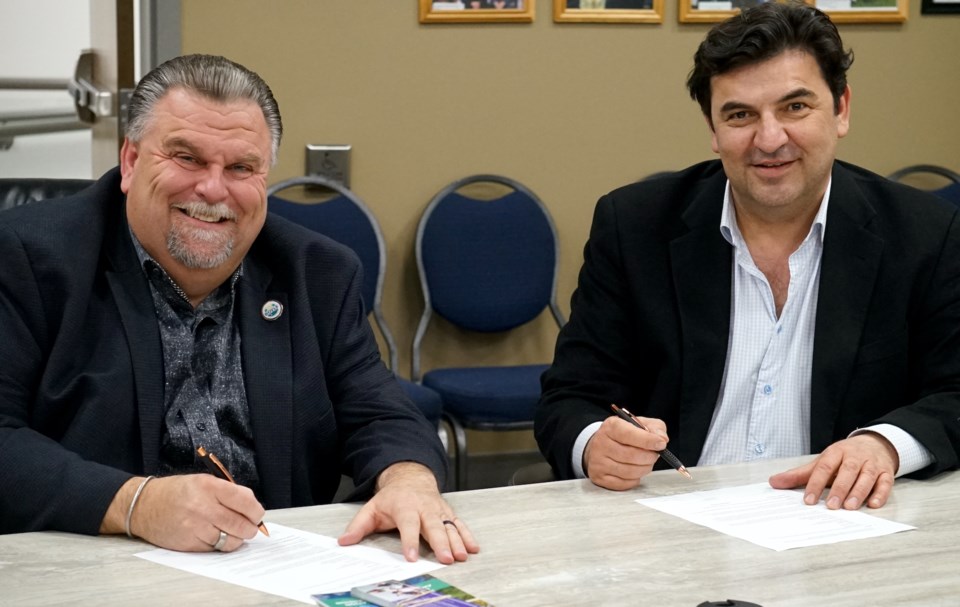BOYLE — Village of Boyle councillors and representatives from Portage College stated their ongoing commitment to collaboration by signing a Memorandum of Understanding (MOU) aimed at broadening both education and work opportunities for employees and students.
Board chair Randy Benson was joined by President Nancy Broadbent March 6 in Boyle council chambers to provide an update on the school’s recent successes and put the two organizations’ parallel plans into writing.
“We’re still growing like great guns,” Broadbent told councillors. The publicly operated post-secondary outlet has been operating in the province for more than 50 years, and has seven locations around Alberta including Lac La Biche, Saddle Lake Cree Nation, and Boyle.
“We’re probably going to be about 1,700 full load equivalent students in our credit programs this year,” added Broadbent, who is nearing her 34th year with the college and has rarely seen enrolment drop below 900. “The last couple of years have been really remarkable for us in growth.”
“I’m definitely a champion for you guys, I think highly of the facility and the way you guys run things,” said mayor Colin Derko. “I’ve noticed in the last couple of years there's a lot of chatter about Portage. That’s interesting you say the numbers are up, because I have noticed that.
“It just seems like it’s really buzzing,” he added.
Employee education
The MOU between the village and the college is the first of its kind, but Derko said the spirit of partnership is nothing new.
“We’ve always collaborated,” said Derko in a March 8 interview. “It’s just more official, but we’ve always worked closely with Portage, especially with Nancy and Randy with the board.”
As a result of the agreement, which will be active until April 2027, village employees will have access to as many as 30 micro credential courses and up to 10 credit courses per year, without the mandatory course price tags.
“There’s some valuable training here that you might be interested in,” said Broadbent. “Some of the training is as short as a one-day course in business … but also when we have room in our credit programs, and if it would work with your schedule, we’d like to offer that to staff, too.”
Costs for books and other class material would still apply, and courses must be able to accommodate part-time learners. And, if waiving the fees is found to negatively impact the viability of the course, limits may apply to the cost reduction available.
Broadbent provided admin with 30 purple tickets for use by village staff and councillors when taking advantage of the discounted courses. For each year the agreement is in place, 30 purple tickets will be made available.
More opportunities
Boyle’s Portage campus offers training programs for pipeline work and heavy equipment operators, but Derko said the village’s vision includes expanding services and marking Boyle as an ideal training location.
“They do have a makeshift campus out there now. My personal vision would be to have some bricks and mortar put in, something that’s for longer-term,” said Derko. The site, located minutes south of the village on Highway 831, is home to a classroom, a training compound, and heavy equipment such as graders and excavators.
Derko said he hopes the partnership will have a positive impact on both the community and students by providing rural Albertan’s with a chance to train, live, and potentially work within a rural setting.
“Boyle is the perfect spot for that,” said Derko. “I’d like to see it where these students come in and get a feel for what it’s like to live in a remote area, where they could be in the bush, living in a camp setting, working in a bush setting, but just on the other side of the bush is a village that has all the amenities they need for conveniences.”
“It’s something that we can offer here a lot easier than a lot of other locations,” he added. “Every area has its strengths and weaknesses, but I believe that’s one of our strengths.”



